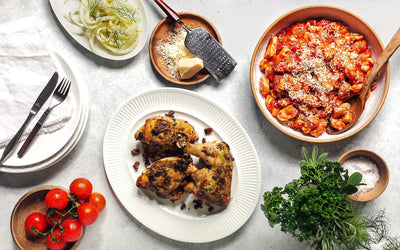Kitchen Memories, A Series - Part I

Preserve the memories that will be created in your kitchen this holiday season...and always.
An opportunity is around the corner, for you to preserve what will be some of your most precious soon to be memories with your family, friends and neighbours in your kitchens.
Have you ever taken in a smell or taste that immediately transported you back to a moment of nostalgia? Isn't it when that taste or smell was combined with a celebration or novelty that it left the longest lasting memory? The annual trip to visit grandparents where you were showered with your grandmother's shortbread? Your aunties in the kitchen cooking the curries of your childhood with the family masala? Sometimes it is not the food, it is the kitchen tool that holds the memories. The carving knife passed down through the generations, that your great grandfather used, the wok or the cast iron pan that has a layer of seasoning added each generation.
This holiday season and beyond I encourage you to bake the shortbread with your grandmother, make the masala with your aunties, create the treats from your childhood - learn these recipes and traditional cooking techniques. This is the legacy, the stories of your family to be passed on to the next generations, keeping those powerful memories alive.
Over the next few weeks we will be sharing some culinary memories from our In My Kitchen family and friends, starting with Melissa.
In My Kitchen host Melissa (Umbrian cooking with Melissa) shares what triggers some of her favourite kitchen memories from her childhood: A cheese grater!
Melissa:
 Photo credit: Cassandra Anderton
Photo credit: Cassandra Anderton
My family goes through a lot of cheese. Great big blocks, and sometimes wheels, of Parmigiano-Reggiano, Montasio and Pecorino. These have always been a staple in our fridge ready to be grated on steaming bowls of pastas or sneaky snacks between meals. My Nonno always liked a mix of cheeses on his pasta, aged Montasio for a bit of bite and Parmigiano for flavor, and I remember him sitting at the kitchen table, a glass (or carafe) of wine close at hand, while he grated a mix of cheeses for a week of meals.

|

|

|
My Nonno used this wooden contraption, a sort of covered box containing a roller with nails and a little drawer to catch the cheese as it grated into the perfect fluffy powder for dressing his pasta – it was old when I was a child and I imagine it must have come with the family when they immigrated in the 60s. We’ve tried a lot of graters through the years, always bringing home a few from our trips to Italy, but really nothing has ever matched my Nonno’s grater. I was lucky enough to inherit it and that grater is now one of the most useful tools in my kitchen and grates cheese as perfectly as it did when I was a child, watching my Nonno and stealing pieces of cheese from the table while he worked. The first photo above shows a guest in Melissa's Umbrian cooking experience trying out the family grater. Center photo (photo courtesy of Cassandra Anderton) is the fruits of labour and the final photo speaks for itself.
|
Nonna and my Zia Amelia rolling out pasta the traditional way |
Nonna and Nonno making sausages |
Nonna's Passatelli recipe (to use up all the delicious grated cheese)

Nonna made Passatelli all the time, a traditional Umbrian/Romagna/Marche dish that not a lot of people know about. We love them – they are served in broth and great on a winter's night.
- 125gr grated Parmigiano Reggiano cheese
- 125gr grated Pecorino cheese
- 125 gr breadcrumbs (use stale bread that is hard enough to grate)
- 4 eggs
- 8 cups chicken stock
- nutmeg to taste (lots of nutmeg!)
- lemon zest (two strips using a potato peeler)
- salt to taste
Work the eggs, the breadcrumbs, 5 oz (150 g) of the cheese, salt, and nutmeg together to form a dough. Cover with plastic wrap and leave to rest for 20 minutes. In a pan, add lemon zest to stock and bring to the boil.
If you do not have a "ferro per passatelli" to make the passatelli, you can use a potato ricer. Pass through all the mixture to obtain strips the length of a finger. Drop the passatelli straight into the boiling stock. Cook thoroughly and serve in soup bowls with the stock and the rest of the grated Parmigiano Reggiano and Pecorino cheese.
Melissa's tip:
"You can make them a bit in advance, just put them out on your board and cover them with a dishtowel so they don’t dry out too much! One of our absolute favourite things to eat. You can also make them ‘asciutti’, that is, dry. So not in broth but with some sort of a sauce – very good with mushrooms."







Leave a comment